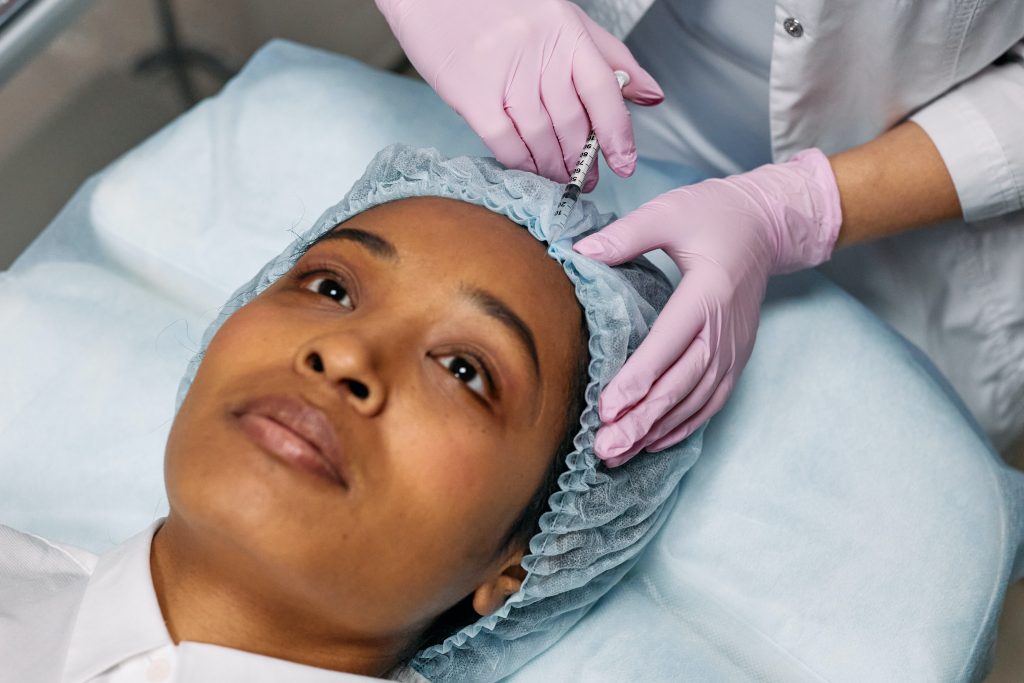Discover when it’s crucial to seek professional help for acne.
When Is the Right Time to See a Dermatologist for Acne?
If your skin is resembling a mountain range, you may be wondering if it’s time to call in the experts. Acne can be a pesky problem that affects different people at different stages of life. So, when is it the right time to wave the white flag and seek the help of a dermatologist? In this guide, we’ll dive into the causes and types of acne, the signs that you should seek professional help, the role of a dermatologist in acne treatment, and what to expect during your first visit. So put on your lab coat and let’s get started!

Understanding Acne: Causes and Types
What is Acne?
Before we dive into the intricacies of when you should seek a dermatologist’s help, let’s get on the same page about what acne actually is. Acne is a skin condition that occurs when your hair follicles become clogged with oil and dead skin cells. What starts as a minor annoyance can quickly evolve into a full-blown breakout, complete with pimples, blackheads, and sometimes even painful cysts. Yikes! But fear not, there’s hope on the horizon.
When it comes to understanding acne, it’s important to know that it doesn’t discriminate. It can affect people of all ages, genders, and skin types. Whether you’re a teenager going through puberty or an adult dealing with hormonal imbalances, acne can make its unwelcome appearance at any time. It’s like a surprise party that no one wants to attend.
But why does acne happen in the first place? Well, there are a few factors at play. One of the main culprits is the overproduction of sebum, an oily substance that keeps your skin hydrated. When your sebaceous glands decide to go into overdrive, it can lead to clogged pores and breakouts. Hormonal fluctuations, stress, diet, and even certain medications can also contribute to the party on your face. Oh, the joys of being human!
Different Types of Acne
Not all acne is created equal. Just like there are different flavors of ice cream, there are different types of acne too. Some of the most common types you may encounter on your skin adventure include whiteheads, blackheads, papules, pustules, nodules, and cysts. Each has its own unique characteristics and level of annoyance. It’s like a never-ending carnival ride, but without the cotton candy.
Whiteheads, also known as closed comedones, are small bumps that appear on the skin’s surface. They occur when the hair follicles are clogged with oil and dead skin cells, but the pore remains closed. Blackheads, on the other hand, are open comedones. They are similar to whiteheads, but the pore is open, allowing the clogged material to oxidize and turn black.
Papules are small, red bumps that can be tender to the touch. They occur when the walls of the hair follicles break down due to inflammation. Pustules, on the other hand, are similar to papules but contain pus. They are often characterized by a white or yellow center surrounded by redness.
When acne becomes more severe, it can lead to the formation of nodules and cysts. Nodules are large, painful bumps that develop deep within the skin. They are often firm to the touch and can take a long time to heal. Cysts, on the other hand, are similar to nodules but are filled with pus. They can be extremely painful and may leave behind scars.
Understanding the different types of acne is crucial for effective treatment. While some types may respond well to over-the-counter remedies, others may require prescription medications or professional intervention. It’s like a puzzle that needs to be solved, piece by piece, to achieve clear and healthy skin.
Recognizing the Signs: When to Seek Professional Help
Acne, the unwelcome visitor that overstays its welcome on your face, can be a frustrating and persistent problem. While many people try various over-the-counter remedies and hope for the best, sometimes it’s necessary to call in the cavalry and seek professional help from a dermatologist. Here are some signs that indicate it may be time to bring in the professionals:

Persistent Acne
Imagine that friend who never seems to take the hint and keeps crashing on your couch. Well, persistent acne can be just as annoying. If you’ve exhausted all your options, said your prayers, and yet acne still won’t leave you alone, it’s time to take action. Persistent acne is a stubborn visitor that refuses to take the hint and vacate your precious face real estate. But fear not, dermatologists have a wide range of treatments and strategies to tackle even the most stubborn acne.
Severe Acne
When acne starts to resemble a full-blown war zone, it’s time to suit up and bring out the big guns. Severe acne can cause deep, painful cysts and nodules that leave scars and can seriously impact your self-confidence. If you’re battling this level of acne, don’t suffer in silence. A dermatologist can assess the situation and provide a customized plan of attack to put those pesky pimples in their place. From prescription medications to advanced therapies, they have the expertise to help you regain control over your skin.
Acne Scarring or Post-Inflammatory Hyperpigmentation
Even after the battle is won and your skin returns to a state of relative calm, acne scarring or post-inflammatory hyperpigmentation can serve as a painful reminder of the past. These leftover marks can take a toll on your self-esteem and make you want to do a disappearing act in social situations. The good news is that dermatologists have an array of treatments at their disposal to help diminish the appearance of scars and give you back your confidence. From laser resurfacing to chemical peels, they can tailor a treatment plan to address your specific needs.
Acne Accompanied by Other Symptoms
Acne can sometimes be a sneaky accomplice, bringing along unwanted friends like pain, inflammation, or unusual skin changes. If you notice any additional symptoms accompanying your acne, it’s time to dial up your dermatologist. They can assess the situation and determine if there’s an underlying issue that requires further investigation. It’s always better to be safe than sorry, especially when it comes to your skin. Your dermatologist can help you navigate any potential complications and provide the necessary guidance to ensure your skin remains healthy and vibrant.
Remember, seeking professional help for your acne is not a sign of weakness or failure. It’s a proactive step towards taking care of yourself and your skin. Dermatologists are experts in their field and can offer personalized solutions to address your specific concerns. So, don’t hesitate to reach out and let them help you on your journey to clear and healthy skin!
The Role of a Dermatologist in Acne Treatment
What Does a Dermatologist Do?
When it comes to your skin, think of a dermatologist as your trusty sidekick. These medical superheroes specialize in all things skin-related and can help diagnose and treat a wide range of skin conditions, including acne. They’re armed with the knowledge and expertise to create a customized treatment plan tailored specifically to your skin type and individual needs. So, no acne is too big or too small for them to handle!
But what exactly does a dermatologist do? Well, apart from being experts in the field of dermatology, they are also skilled diagnosticians. They can assess your skin condition by examining your skin and asking you questions about your medical history. This comprehensive approach allows them to identify the underlying causes of your acne and develop an effective treatment plan.
Additionally, dermatologists are well-versed in the latest advancements in skincare technology. They stay up-to-date with the newest research and breakthroughs in the field, ensuring that they can offer you the most cutting-edge treatments available. So, when you consult a dermatologist for your acne, you can rest assured that you’re receiving the best and most advanced care.
How Can a Dermatologist Help with Acne?
A dermatologist is like a magician, but instead of pulling rabbits out of hats, they pull out prescription-strength treatments and cutting-edge procedures to banish your acne woes. From topical creams and gels to oral medications and in-office procedures, they have a vast arsenal of weapons to fight acne on multiple fronts. They’ll work closely with you to determine the best course of action and guide you on your journey to clearer skin.
One of the key advantages of consulting a dermatologist for acne treatment is their ability to prescribe prescription-strength medications. These medications are more potent and effective than over-the-counter products, as they contain higher concentrations of active ingredients. Dermatologists can prescribe topical treatments that contain ingredients like retinoids, benzoyl peroxide, or salicylic acid, which have been proven to effectively combat acne.
In addition to topical treatments, dermatologists can also prescribe oral medications to address acne from within. Oral antibiotics, hormonal medications, and isotretinoin are some examples of prescription medications that dermatologists may recommend. These medications can help control inflammation, reduce sebum production, and regulate hormonal imbalances, all of which play a role in the development of acne.
Furthermore, dermatologists can perform in-office procedures to treat acne that is resistant to conventional treatments. These procedures may include chemical peels, microdermabrasion, laser therapy, or extraction of comedones (blackheads and whiteheads). By utilizing these advanced procedures, dermatologists can target stubborn acne lesions and promote faster healing.
Aside from their medical interventions, dermatologists also play a crucial role in educating and empowering patients. They can provide guidance on proper skincare routines, recommend non-comedogenic products, and offer lifestyle advice to help prevent future breakouts. By addressing both the physical and emotional aspects of acne, dermatologists can support their patients in achieving long-term skin health and confidence.
The Process of Seeing a Dermatologist for Acne
What to Expect During Your First Visit
Your first visit to a dermatologist can be a mix of nerves and anticipation, but fear not, it’s all part of the process. During your initial consultation, your dermatologist will assess the severity of your acne, discuss your medical history, and ask about any previous treatments you’ve tried. They may also examine your skin under the bright lights and magnifying glasses of their magical tools. Based on this evaluation, they’ll create a treatment plan tailored to your unique needs. Magic at its finest!
Common Acne Treatments Prescribed by Dermatologists
Now that you’re armed with a personalized treatment plan from your dermatologist, it’s time to put it into action. Common acne treatments prescribed by dermatologists may include topical retinoids, antibiotics, oral contraceptives, isotretinoin, and various in-office procedures such as chemical peels or laser therapy. It’s a game of trial and error, as what works for one person may not work for another. But fear not, your dermatologist will be with you every step of the way, adjusting your treatment plan as needed. Together, you’ll conquer those pesky pimples!
In conclusion, there’s no need to suffer silently with acne. Whether you’re dealing with persistent breakouts, severe acne, or lingering scars, a dermatologist can be your secret weapon in the fight for clear skin. So, when is the right time to see a dermatologist for acne? Whenever you decide that enough is enough and you’re ready to take back control of your skin. Don’t be shy – make that call and embark on a journey towards the skin of your dreams. Your future acne-free self will thank you!





